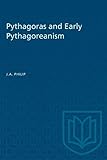Pythagoras and Early Pythagoreanism / ed. by J.A. Philip.
Material type: TextSeries: HeritagePublisher: Toronto : University of Toronto Press, [1966]Copyright date: ©1966Description: 1 online resource (216 p.)Content type:
TextSeries: HeritagePublisher: Toronto : University of Toronto Press, [1966]Copyright date: ©1966Description: 1 online resource (216 p.)Content type: - 9781487580872
- 9781487579791
- 182.2 22
- B243 .P45 1981eb
- online - DeGruyter
| Item type | Current library | Call number | URL | Status | Notes | Barcode | |
|---|---|---|---|---|---|---|---|
 eBook
eBook
|
Biblioteca "Angelicum" Pont. Univ. S.Tommaso d'Aquino Nuvola online | online - DeGruyter (Browse shelf(Opens below)) | Online access | Not for loan (Accesso limitato) | Accesso per gli utenti autorizzati / Access for authorized users | (dgr)9781487579791 |
restricted access online access with authorization star
http://purl.org/coar/access_right/c_16ec
Pythagoras and the Pythagoreans of the fifth century are cast by historians of philosophy in four important roles: they are reputed to have originated the mathematical disciplines, harmonics, and, in a large measure, astronomy; they are said to have propounded theories of the nature of our universe to which, in differing ways, Parmenides, Empedocles, Anaxagoras, and Democritus reacted; they are reputed to have made the alliance between religion and philosophy that made philosophy in the ancient world a way of life; and their thought is alleged to have exerted a major influence on Plato, and particularly on the metamathematical theories of his later years. Professor Philip here examines the evidence for these assertions, both in its general lines and in particular instances. As a basis for his own reconstruction he has taken what Aristotle tells us of the Pythagoreans, on the grounds that Aristotle is our earliest important witness, that the extent of his own testimony is considerable, and that he is not touched by the pro- or anti-Pythagorean bias of later writers. As a result of this investigation it is argued that substantial modifications must be made of generally accepted views of the role of Pythagoras and early Pythagoreans, and in consequence of the history of thought.
Mode of access: Internet via World Wide Web.
In English.
Description based on online resource; title from PDF title page (publisher's Web site, viewed 01. Nov 2023)


